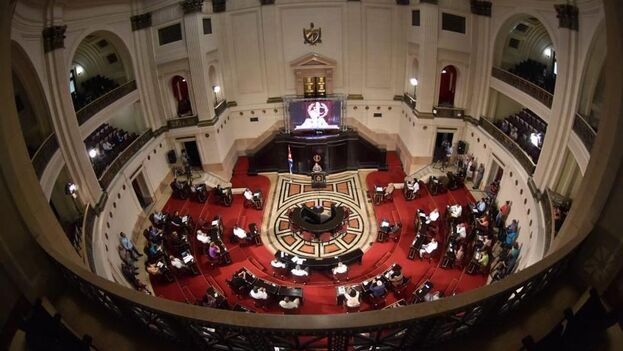
![]() 14ymedio, Reinaldo Escobar, Havana, 12 February 2023 — If the massive abstention is as successful as the opposition expects in the electoral process scheduled for March 26, none of what is outlined here would make sense.
14ymedio, Reinaldo Escobar, Havana, 12 February 2023 — If the massive abstention is as successful as the opposition expects in the electoral process scheduled for March 26, none of what is outlined here would make sense.
The Cuban Parliament scheduled for the X Legislature of the National Assembly could be the last to have the presence of members of the so-called “historical generation”: Raúl Castro, Ramiro Valdés, José Ramón Machado Ventura, Guillermo García and Ramón Pardo Guerra — all nonagenarians — will return to their seats again, but they will have very little chance of being around to be re-elected in 2028.
In the recently released list of candidates, the notable absences are striking: the one who was held as the manager of the Ordering Task*, Marino Murillo; the Minister of Culture, Alpidio Alonso; the Minister of Science, Technology and the Environment, Elba Rosa Pérez Montoya; the Minister of Education Ena Elsa Velázquez Cobiella; the Comptroller of the Republic Gladys María Bejerano; Rodrigo Malmierca, Minister of Foreign Trade and Foreign Investment; Samuel Carlos Rodiles Planas, President of the Physical Planning Institute; and the cosmonaut Arnaldo Tamayo; they no longer they will raise their hands again to approve what they propose.
Among the 470 candidates proposed, who will surely be elected, 128 deputies from the previous legislature repeat: they are the survivors of the drastic reduction of the number of seats in Parliament.
If the current occupant of the position of President of the Republic were not appointed to repeat his mandate (which is unlikely, but possible), a member of Parliament under 60 years of age would have to be elected by law. These repeaters are supposedly the ones who would have the best chances against the upstarts.
Among them there are 33 born between 1963 and 1968 who on this occasion meet the requirement of not exceeding 60 years of age to be appointed as president of the Republic, but who by the next election, in 2028, would already be past that age.
This forecast can be closer to reality if it is specified that, among the 33 blessed (and punished) by the almanac, only 4 are members of the Political Bureau of the Communist Party: Manuel Marrero Cruz, who is also Prime Minister; Roberto Tomás Morales Ojeda who is the second in the hierarchy in the structure of the Communist Party; Marta Ayala Ávila, General Director of the Center for Genetic Engineering and Biotechnology; and Teresa María Amarelle Boué, who is a member of the Political Bureau for being the general secretary of the Federation of Cuban Women.
Four others belong to the Council of State and also appear on the Central Committee, these are: Gerardo Hernández Nordelo, Miriam Nicado García, Homero Acosta Álvarez and Ana María Mari Machado.
I conclude the list with: Luis Antonio Torres Iríbar, and Jorge Luis Tapia Fonseca, members of the Central Committee and first secretaries of the communist party in the provinces; José Ángel Portal Miranda, Minister of Public Health; Inés María Chapman Waugh, Deputy Prime Minister of the Republic; and Rogelio Polanco Fuentes, member of the Secretariat and head of the Ideological Department in the Central Committee of the Party.
This hypothetical investiture, even if they have no aspirations, is presented to these 13 as a last chance. In five years the list of possible suitors would be made up of virtually unknown people, unless the age requirement is modified.
There can always be surprises. The first would be that Miguel Díaz-Canel does not continue in the position of President of the Republic. The second is that someone is appointed to replace him who is not mentioned in the previous paragraphs.
It is not that the country is inevitably headed for a radical change, nor that because another person mentioned here is placed at the helm of the nation, these changes will occur in the necessary direction, depth and speed. It is not about that, but that the changes towards democracy and economic freedoms are the main demand that is being called for with more pressure from within and from without, and that nothing would delay this process of change more than the continuity that is proclaimed today as a motto from power.
*Translator’s note: Tarea ordenamiento = the [so-called] ‘Ordering Task’, is a collection of measures that include eliminating the Cuban Convertible Peso (CUC), leaving the Cuban peso as the only national currency, raising prices, raising salaries (but not as much as prices), opening stores that take payment only in hard currency which must be in the form of specially issued pre-paid debit cards, and many other measures related to the economy.
____________
COLLABORATE WITH OUR WORK: The 14ymedio team is committed to practicing serious journalism that reflects Cuba’s reality in all its depth. Thank you for joining us on this long journey. We invite you to continue supporting us by becoming a member of 14ymedio now. Together we can continue transforming journalism in Cuba.
